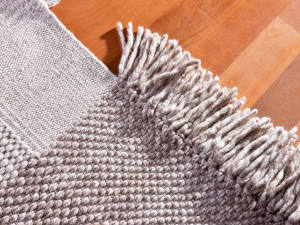Bremworth reintroduces solution-dyed nylon while backing wool carpets
Carpet maker Bremworth is reinstating solution-dyed nylon (SDN) into its product mix but says wool carpets remain central to its brand.
 The development of fully compostable carpet that can be mass-produced in a financially viable way would be transformational for New Zealand’s wool exports, says Bremworth chief executive Greg Smith.
The development of fully compostable carpet that can be mass-produced in a financially viable way would be transformational for New Zealand’s wool exports, says Bremworth chief executive Greg Smith.
The development of a prototype rug which contains no plastic materials could bring New Zealand’s wool export industry closer to mass production of fully compostable carpets.
According to data from the Ministry for the Environment, textiles, including carpet, make up approximately 5% of New Zealand landfill volumes with over 186,000 tonnes entering the waste stream each year.
Greg Smith, Bremworth chief executive, says the development of fully compostable carpet that can be mass-produced in a financially viable way would be transformational for New Zealand’s wool exports.
He says the three-year research initiative was launched as a response to consumer demand for an environmentally sound, end-of-life solution for carpet.
“We know there has been a post-pandemic shift in the way our international customers are seeing New Zealand wool, with a growing number looking to integrate natural fibre products into their home environment.
“While design and quality remain key drivers for most segments, what happens at the end of a product’s useful life is becoming an increasingly important factor in the purchase decision.”
He says that ultimately, for New Zealand wool products to carry a price premium in key export markets, the sector needs to invest in the creation of added-value products.
“Our latest research initiative is designed to help us build a product range which can be meaningfully reused or naturally returned to the earth in a way that resonates with our customer base - without compromising the design and performance that they care about,” he says.
Dr Kristine Hulse, sustainability lead at Bremworth, says while wool is a natural fibre which can break down due to its organic composition, most wool carpets use a polypropylene backing and latext which contain synthetic materials – preventing the product from being composted.
She says the new rug, which is hand woven from natural materials including sheep wool and alpaca fibres, was created as part of a rapid prototyping research initiative – designed to test a number of sustainability concepts in textile design.
Each step in the programme is designed to address barriers preventing carpet from completely breaking down at the end of its life.
“By preserving the natural integrity of the fibre we can increase the number of opportunities for product circularity, increase the number of secondary uses for used carpet and significantly reduce volumes of textiles entering the landfill,” she says.
Hulse says crossbred sheep and alpaca fibres were used in the first prototyping process to provide a broader range of colours but more trials are underway to find alternatives to the use of alpaca yarn – which is in limited supply in New Zealand.
Buying or building a rural or semi-rural property? Make sure you know where the wastewater goes, says Environment Canterbury.
With collars on more than seven million cows worldwide, Nedap says its standalone launch into New Zealand represents world-leading, reliable and proven smart technology solutions for dairy farmers.
The Meat Industry Association (MIA) is once again looking for game-changing ideas for New Zealand's red meat processing and exporting sector.
Environment Southland is inviting feedback on two bylaws that play a critical role in safeguarding the region's waterways and ensuring the safety of the local community.
While the North Island is inundated with rain, Southland is facing receding water levels as warm weather and lack of rainfall continues.
Entries have opened for the 2026 Fieldays Innovation Awards.

OPINION: Meanwhile, red blooded Northland politician Matua Shane Jones has provided one of the most telling quotes of the year…
OPINION: This old mutt has been around for a few years now and it seems these ‘once in 100-year’ weather…